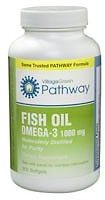What is Omega 3 Good For? Find Answers Here
Omega 3
The body needs fat. Fat provides energy reserves, protects vital organs, helps maintain body temperature, carries fat soluble nutrients and provides the major material of which cell membranes are made of. However, the majority of fat in the diet should come from healthy fats, such as monounsaturated and polyunsaturated fats. Saturated fats should be limited and trans fats should be avoided.
Omega 3 is a polyunsaturated fat with anti-inflammatory properties. The body does not make it, so humans must get it through food or supplementation. Research indicates that it may be better absorbed from food than supplements. The best food source is cold water fish, such as salmon, tuna, cod, mackerel and herring. This essential nutrient appears to have many health benefits. So what is omega 3 good for?
Benefits
Asthma
Not all studies have shown positive results but several have shown that taking omega 3 supplements (fish oils that contain docosahexanoic acid [DHA] and eicosapentaenoic acid [EPA]) offer significant benefits in treating asthma. It has also been shown that children who eat fish more than once a week have a lower risk of developing asthma than children who do not regularly eat fish.
Depression
An insufficiency of omega 3 has been linked to depression. However, studies show mixed results as to whether taking this nutrient can help treat symptoms. Several studies have shown that people who took omega 3 in addition to antidepressant drugs had more improvement in symptoms than those who took drugs alone.
Glaucoma
Glaucoma is due to an increased pressure within the eye (intraocular). According to a study involving rabbits, a significant drop in intraocular pressure (IOP) was noted after feeding them food soaked in cod liver oil. When they were taken off cod liver oil, their IOP returned to baseline.
Heart Disease
Many studies have shown that fish oil supplements are very effective in lowering high blood pressure. Omega 3 is also known to decrease platelet aggregation, excessive stickiness of blood platelets that can lead to heart attacks and strokes. According to results from autopsy studies, the highest degree of coronary artery disease (CAD) is found in those with the lowest concentration of omega 3 in their fat tissues and those with the lowest degree of CAD had the highest concentration of omega 3.
Macular Degeneration
According to a questionnaire involving over 3,000 people and a study involving 850 participants, those who ate more fish in their diets were less likely to have this age-related eye disease that can lead to blindness.
Osteoporosis
According to some studies, omega 3 may help increase calcium levels in the body and improve bone strength.
Rheumatoid Arthritis
Several studies have found that fish oil helps relieve morning stiffness and joint tenderness. In addition, supplementation has been shown to suppress the production of inflammatory compounds secreted by white blood cells.
Skin, Hair and Nails
Omega 3 is not just good for treating and preventing diseases, it is also great for the skin, hair and nails. It can help prevent:
- dry, scaly skin
- dull, slow growing hair
- soft, brittle nails
If you are pregnant or breastfeeding, have a medical condition or are taking medications, consult your health care provider before taking omega 3 supplements.
References
Michael Murray, N.D. and Joseph Pizzorno, N.D. Encyclopedia of Natural Medicine (1998)
University of Maryland Medical Center: Omega-3 fatty acids - https://www.umm.edu/altmed/articles/omega-3-000316.htm
Photo by Village Green Apothecary / Flickr
Disclaimer
Please read this disclaimer regarding the information contained within this article.
